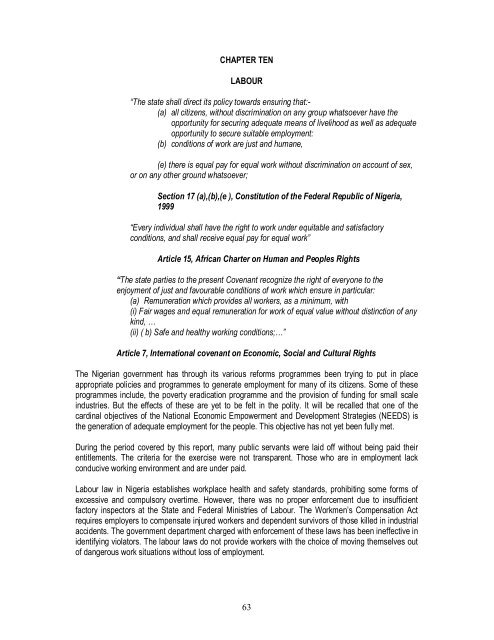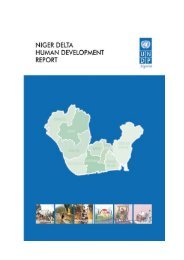THE STATE OF HUMAN RIGHTS IN NIGERIA 2005 - UNDP Nigeria ...
THE STATE OF HUMAN RIGHTS IN NIGERIA 2005 - UNDP Nigeria ...
THE STATE OF HUMAN RIGHTS IN NIGERIA 2005 - UNDP Nigeria ...
You also want an ePaper? Increase the reach of your titles
YUMPU automatically turns print PDFs into web optimized ePapers that Google loves.
CHAPTER TENLABOUR“The state shall direct its policy towards ensuring that:(a) all citizens, without discrimination on any group whatsoever have theopportunity for securing adequate means of livelihood as well as adequateopportunity to secure suitable employment:(b) conditions of work are just and humane,(e) there is equal pay for equal work without discrimination on account of sex,or on any other ground whatsoever;Section 17 (a),(b),(e ), Constitution of the Federal Republic of <strong>Nigeria</strong>,1999“Every individual shall have the right to work under equitable and satisfactoryconditions, and shall receive equal pay for equal work”Article 15, African Charter on Human and Peoples Rights“The state parties to the present Covenant recognize the right of everyone to theenjoyment of just and favourable conditions of work which ensure in particular:(a) Remuneration which provides all workers, as a minimum, with(i) Fair wages and equal remuneration for work of equal value without distinction of anykind, …(ii) ( b) Safe and healthy working conditions;…”Article 7, International covenant on Economic, Social and Cultural RightsThe <strong>Nigeria</strong>n government has through its various reforms programmes been trying to put in placeappropriate policies and programmes to generate employment for many of its citizens. Some of theseprogrammes include, the poverty eradication programme and the provision of funding for small scaleindustries. But the effects of these are yet to be felt in the polity. It will be recalled that one of thecardinal objectives of the National Economic Empowerment and Development Strategies (NEEDS) isthe generation of adequate employment for the people. This objective has not yet been fully met.During the period covered by this report, many public servants were laid off without being paid theirentitlements. The criteria for the exercise were not transparent. Those who are in employment lackconducive working environment and are under paid.Labour law in <strong>Nigeria</strong> establishes workplace health and safety standards, prohibiting some forms ofexcessive and compulsory overtime. However, there was no proper enforcement due to insufficientfactory inspectors at the State and Federal Ministries of Labour. The Workmen’s Compensation Actrequires employers to compensate injured workers and dependent survivors of those killed in industrialaccidents. The government department charged with enforcement of these laws has been ineffective inidentifying violators. The labour laws do not provide workers with the choice of moving themselves outof dangerous work situations without loss of employment.63










